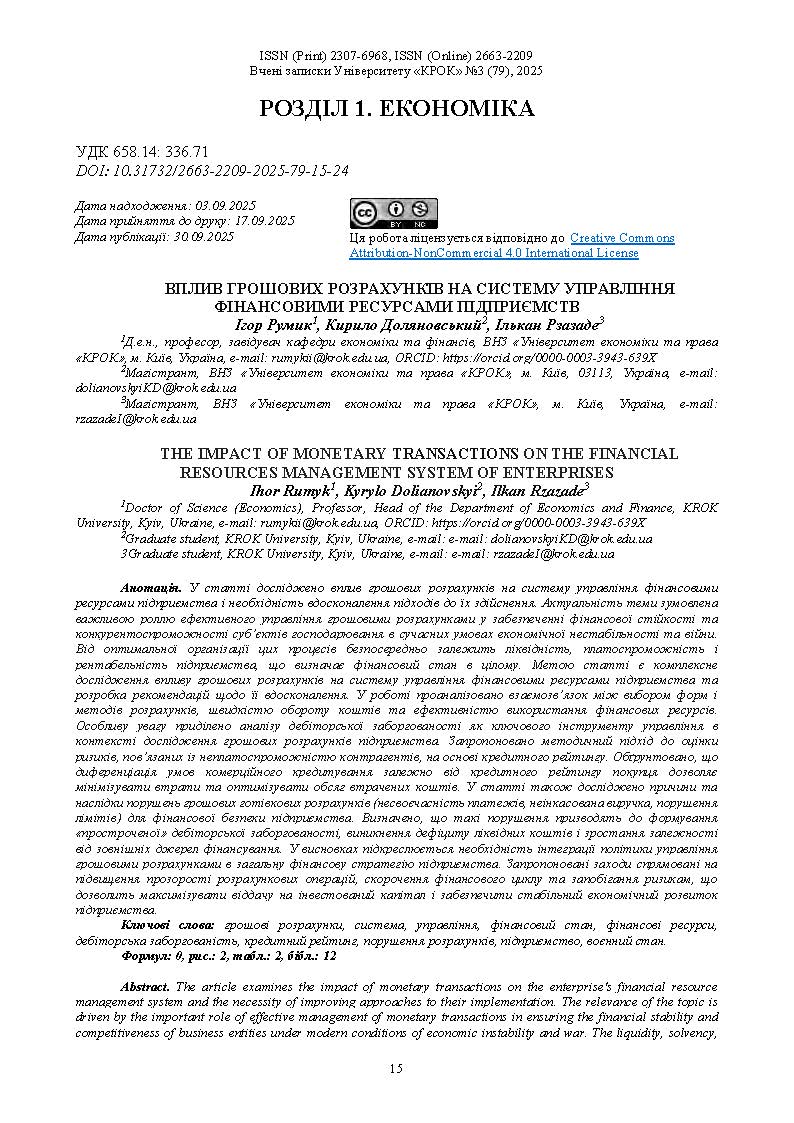ВПЛИВ ГРОШОВИХ РОЗРАХУНКІВ НА СИСТЕМУ УПРАВЛІННЯ ФІНАНСОВИМИ РЕСУРСАМИ ПІДПРИЄМСТВ
DOI:
https://doi.org/10.31732/2663-2209-2025-79-15-24Ключові слова:
грошові розрахунки, система, управління, фінансовий стан, фінансові ресурси, дебіторська заборгованість, кредитний рейтинг, порушення розрахунків, підприємство, воєнний станАнотація
У статті досліджено вплив грошових розрахунків на систему управління фінансовими ресурсами підприємства і необхідність вдосконалення підходів до їх здійснення. Актуальність теми зумовлена важливою роллю ефективного управління грошовими розрахунками у забезпеченні фінансової стійкості та конкурентоспроможності суб’єктів господарювання в сучасних умовах економічної нестабільності та війни. Від оптимальної організації цих процесів безпосередньо залежить ліквідність, платоспроможність і рентабельність підприємства, що визначає фінансовий стан в цілому. Метою статті є комплексне дослідження впливу грошових розрахунків на систему управління фінансовими ресурсами підприємства та розробка рекомендацій щодо її вдосконалення. У роботі проаналізовано взаємозв’язок між вибором форм і методів розрахунків, швидкістю обороту коштів та ефективністю використання фінансових ресурсів. Особливу увагу приділено аналізу дебіторської заборгованості як ключового інструменту управління в контексті дослідження грошових розрахунків підприємства. Запропоновано методичний підхід до оцінки ризиків, пов’язаних із неплатоспроможністю контрагентів, на основі кредитного рейтингу. Обґрунтовано, що диференціація умов комерційного кредитування залежно від кредитного рейтингу покупця дозволяє мінімізувати втрати та оптимізувати обсяг втрачених коштів. У статті також досліджено причини та наслідки порушень грошових готівкових розрахунків (несвоєчасність платежів, неінкасована виручка, порушення лімітів) для фінансової безпеки підприємства. Визначено, що такі порушення призводять до формування «простроченої» дебіторської заборгованості, виникнення дефіциту ліквідних коштів і зростання залежності від зовнішніх джерел фінансування. У висновках підкреслюється необхідність інтеграції політики управління грошовими розрахунками в загальну фінансову стратегію підприємства. Запропоновані заходи спрямовані на підвищення прозорості розрахункових операцій, скорочення фінансового циклу та запобігання ризикам, що дозволить максимізувати віддачу на інвестований капітал і забезпечити стабільний економічний розвиток підприємства.
Завантаження
Посилання
Becker, G. (1965). A Theory of the Allocation of Time. The Economic Journal, Volume 75, Issue 299, 1 September 1965, Pages 493-517. DOI: https://doi.org/10.2307/2228949
Jensen, M.C. (1986). Agency Costs of Free Cash Flow, Corporate Finance, and Takeovers. The American Economic Review, 76(2), 323-329. URL: http://www.jstor.org/stable/1818789
Kaplan, R., & Norton, D. (1992). The Balanced Scorecard-Measures that Drive Performance. Harvard Business Review. URL: https://hbr.org/1992/01/the-balanced-scorecard-measures-that-drive-performance-2
НБУ, (2024). Про затвердження Змін до Положення про ведення касових операцій у національній валюті в Україні: Постанова Правління Національного банку України від 23.08.2024 року №100. URL: https://zakon.rada.gov.ua/laws/show/v0100500-24
Покиньчереда, В.В., & Тімченко, О.Л. (2024). Аналіз грошових потоків у системі фінансового менеджменту підприємства. Modern Economics, 46, 112-119. DOI: https://doi.org/10.31521/modecon.V46(2024)-15
Porter, M.E. (1985). The Competitive Advantage: Creating and Sustaining Superior Performance. NY: Free Press (Republished with a new introduction, 1998). URL: https://id.lib.harvard.edu/alma/990004736830203941/catalog
РайффайзенБанк (2024). Все про безготівковий розрахунок. URL: https://raiffeisen.ua/uk/aem/blog/biznesu/bezghotivkovyi-rozrakhunok.html
Румик, І., Плетенецька, С., & Царенок, О. (2023). Особливості управління фінансовими ресурсами підприємств в умовах воєнного стану. Вчені записки Університету «КРОК», 4(72), 9-19. DOI: https://doi.org/10.31732/2663-2209-2023-72-9-19
Stiglitz, J. (2022). Globalization and Its Discontents. URL: http://digamo.free.fr/stig2002.pdf
Стусь, Ю., & Чумаченко, О. (2024). Управління фінансовими ресурсами підприємства. Вчені записки Університету «КРОК», 4(76), 80-89. DOI: https://doi.org/10.31732/2663-2209-2024-76-80-89
UTEKA, (2022). Готівкові розрахунки. URL: https://services.uteka.ua/ua/publication/data-16-kassovyje-operacii-i-rro-dani-306-nalichnye-raschety
Чумаченко, О., Плетенецька, С., & Антонець, Т. (2024). Управління фінансовим станом підприємств у системі стратегічного менеджменту. Вчені записки Університету «КРОК», 1(73), 54-65. DOI: https://doi.org/10.31732/2663-2209-2024-73-54-65

Downloads
Опубліковано
Як цитувати
Номер
Розділ
Ліцензія

Ця робота ліцензується відповідно до Creative Commons Attribution-NonCommercial 4.0 International License.

